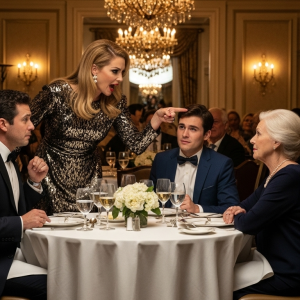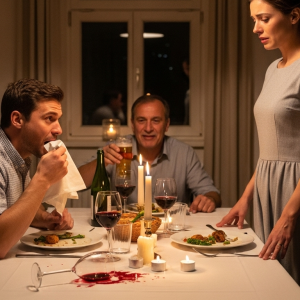The makeup, a carefully constructed mask of bridal joy, was half-removed when the knock came. It was soft, hesitant, but it landed like a hammer blow in the opulent silence of the 5-star hotel suite. In an instant, the scent of champagne and roses was replaced by something cold and suffocating.
My father-in-law, Mr. Rajendra Mehta, stood in the doorway. He wouldn’t meet my eyes. His gaze was fixed on a point somewhere over my shoulder, as if looking at me directly was a sin he couldn’t afford. He shoved a thick wad of cash into my hand—ten crisp $100 bills—and his voice was a ragged, terrified whisper.
“If you want to stay alive, run. Leave tonight.”
I froze, the blood turning to ice in my veins. My name is Anjali. Just hours ago, I was an accountant from Delhi who had married her dream. Raghav, my husband, was the handsome, charming CEO of a dynasty, the only son of a family whose name was synonymous with wealth in Lucknow. Our six-month romance had been a fairytale.
He made me feel safe. That was his gift. He built a fortress of charm around me, and I had mistaken it for a sanctuary.
“I… I don’t understand, Uncle,” I stammered, the heavy bridal lengha suddenly feeling like a shroud.
He finally looked at me, and his eyes were hollowed out by a terror so profound it stole my breath. It was the look of a man who had been a ghost in his own life for a very long time.
“There is no time for questions,” he rasped, his grip tightening on my arm. “Someone will be waiting for you outside the main entrance. Do not go home. Do not contact your family. Do not come back. This is the only help I can offer you.”
He released me as if my touch had burned him and was gone, melting back into the hallway. I stood trembling, the thousand dollars in my hand feeling as heavy as a tombstone. From the adjoining room, I could hear Raghav’s carefree laughter as he spoke on the phone with friends, blissfully unaware that his own father had just orchestrated his bride’s escape.
Panic, cold and sharp, seized me. I didn’t know who the monster was. Was it the quiet, haunted man who just warned me, or the laughing, beautiful man I had just married?
I called the only person I knew I could trust. My best friend, Priya.
“Anjali? What’s wrong? You sound…”
“Priya,” I whispered, my voice cracking. “You have to come get me. Right now.”
“Have you lost your mind? Run away on your wedding night?” Priya’s voice on the other end of the line was a mixture of shock and alarm. I told her everything, the words tumbling out in a panicked, incoherent stream.
The line went silent. When she spoke again, all traces of disbelief were gone. Her voice was grim. “If his father said that, Anjali, it’s not a joke. It’s a death sentence. I’m on my way.”
Ten minutes later, I was dragging my suitcase through the gleaming hotel lobby, my head bowed, my wedding finery hidden beneath a plain coat. I felt like a fugitive, my heart pounding with every step. Outside, at 2:17 a.m., a gentle Delhi drizzle was falling, blurring the city lights into a watercolor of my shattered dreams.
At Priya’s apartment, I turned off my phone. But the silence was no comfort. I saw my reflection in her window—a bride-turned-refugee, stripped of her fairytale in a single, terrifying whisper.
The next morning, the dam of silence broke. I turned my phone on, and it convulsed with notifications. Thirty missed calls from my mother. Dozens from Raghav’s family. And his… messages oscillating between confusion, pleading, and a chillingly cold anger.
But one message, from an unknown number, made my blood run cold:
“My father is a good man, but his courage is a flickering candle in a storm. He cannot save you. If you return, you will either discover the truth about this family, or you will disappear like the others.”
That evening, a direct message from Mr. Mehta arrived: “If you are still in Delhi, meet me. One final time. 8 p.m., Cafe Imperial, second floor. I will tell you everything.”
I knew it was a risk. It could be a trap. But the alternative—living the rest of my life as a ghost, haunted by a question I was too afraid to answer—was worse. I had to go.
The cafe was a relic, tucked away in a quiet, forgotten alley in Old Delhi. I climbed the creaking wooden stairs to the second floor. He was already there, a silhouette against the dim light, looking smaller and more tired than I had ever seen him.
He didn’t waste time with pleasantries. He spoke in a low, urgent whisper.
“You know Raghav is our only son. But you do not know about his first wife, do you?”
The air in my lungs turned to glass. “He… was married before?”
He gave a short, bitter nod. “No one told you. Her name was Neha. She died two months after their wedding. A fall down the stairs, the official report said. But everyone in that house knows the truth. It was not an accident.”
My heart hammered against my ribs. “Why didn’t you…?”
“Because I was a coward,” he interrupted, his voice thick with self-loathing. “I have been a coward for thirty years. But I am telling you now, because I saw the way he looked at you. You are next.”
He slid a small USB drive across the table. “This contains a voice recording and several documents. The truth is in there. But you must not let anyone know you have it.”
“Why can’t you take this to the police?” I pleaded, my voice barely a whisper.
He laughed, a broken, hollow sound that held no humor. “Because in this city, our family name is more powerful than the law. The police will not touch us. They are bought and paid for.”
Back in the sterile safety of Priya’s apartment, I plugged the USB into her laptop. There were three files: an eight-minute audio recording, scanned medical documents, and a handwritten report.
I clicked on the audio file first. A woman’s voice, clear but trembling with a fear that was terrifyingly familiar, filled the room.
“I can’t stay here. Since the wedding, Raghav hasn’t let me leave the house alone. He changes the locks every week. His mother… she says I must give birth to a son. She says if I fail, I will be ‘taken care of,’ just like the others before me. I don’t understand what I did wrong…”
It was Neha. The recording was dated just two days before her death.
The handwritten report was from Mr. Mehta himself. It was a confession, not of his actions, but of his silence. He detailed a dark family history, a lineage poisoned by madness and ritual.
A great-grandfather who murdered his wife, believing a virgin’s blood was required to preserve the family’s fortune.
A mother-in-law, my mother-in-law, obsessed with dark astrology, who believed any bride who failed to produce a male heir within the first year must be “eliminated” to cleanse the family line.
Neha had died within three months. An entry noted another bride, years before, who had reportedly taken her own life. Everything had been erased, swept under a rug of money and influence. Raghav—the charming, gentle man who had kissed my forehead only days ago—was the instrument of his family’s monstrous tradition.
I felt a wave of nausea. Priya put a steadying hand on my shoulder. “You can’t just run,” she said, her voice firm. “They will find you. We need a plan. A real one.”
With the help of Priya and a trusted journalist friend, we made copies of everything. We submitted the package anonymously to a special investigative unit in another state, bypassing the local police Mr. Mehta had warned me about. We contacted a lawyer who specialized in fighting powerful families.
Three days later, the investigation began. It wasn’t front-page news—the Mehta family’s influence ensured that—but it was real. Raghav and his parents were summoned for questioning. And for the first time in his life, Mr. Mehta agreed to testify against his own family.
A few weeks later, I officially filed for divorce. The confrontation I had dreaded was quiet, almost sterile. Raghav simply stared at me in the lawyer’s office, his handsome face a blank canvas. The warmth and charm I had fallen in love with were gone, replaced by an unnerving emptiness.
“So you’re leaving me too,” he said, not as a question, but as a statement of fact. “Just like the others.”
A shiver traced its way down my spine. There was no anger, no sadness, no regret in his eyes. There was nothing at all.
A month later, the official investigation was quietly closed, citing “insufficient evidence.” But the damage was done. The story circulated in legal and business circles, a poison that money couldn’t entirely neutralize.
I no longer cared what happened to Raghav. I left Delhi and moved to Mumbai, severing all ties to my old life. My parents, though heartbroken by the scandal, stood by me. They finally understood that I hadn’t run from a marriage; I had run for my life.
Sometime later, a handwritten letter arrived, forwarded by Priya. There was no return address. Just a few lines.
“You did what I was too afraid to do for thirty years. Your courage has given me mine. Thank you. — Your Father-in-Law”
The tears I hadn’t allowed myself to shed finally came. I am no longer the naive Anjali who believed in fairytales. That girl died on her wedding night. But I believe in something else now. I believe that evil often wears a beautiful mask, and that sometimes, the most courageous act is simply choosing to survive.
Two years passed. Mumbai became my sanctuary, a city of strangers vast enough for a woman with a shattered past to disappear. I had rebuilt my life meticulously, brick by brick. I had a good job at a financial firm, a small apartment overlooking a noisy street, and a routine that gave me the illusion of peace.
But the peace was only surface-deep. Underneath, the terror remained, a cold undercurrent. I had become an expert in security. My door had three locks. I never took the same route home two days in a row. I avoided men who seemed “too charming,” because Raghav’s charm had been the mask that hid the monster. I was a survivor, but I was also a prisoner of my memories.
The letter from Mr. Mehta was kept in a locked box. It was both a reminder of unexpected goodness and proof of the evil I had escaped. Sometimes, at night, I wondered what had become of him. Courage has its price, and I knew the Mehta family would not forgive betrayal.
Then one evening, as the monsoon began to sweep into the city, my phone rang. It was Priya. We still spoke weekly, my last connection to my old life, a voice untainted by deceit. But this time, her voice was strained.
“Anjali,” she began, skipping the usual pleasantries. “There’s news from Delhi. About the Mehtas.”
I sat up straight on my sofa, my heart beginning to beat a dreadfully familiar rhythm. “What is it?”
“Mr. Mehta… he’s disappeared.”
“Disappeared? What do you mean?”
“The official story is that he retired for his health,” Priya said, her voice low. “They say he went to an ashram in the mountains to find peace. But Anjali, it’s a lie. I have a friend in the medical field. She heard the rumors. He isn’t in an ashram. They’ve had him committed to a private mental institution. Against his will.”
The air in my apartment seemed to vanish. His wife and son. They had locked him away. That was the price for saving my life.
“Priya, how could they?”
“Money, Anjali. Power. They had two doctors sign off, saying he had a nervous breakdown after the ‘stress’ of your divorce. They turned him into a madman to invalidate his testimony. They’ve buried him alive.”
A cold guilt washed over me, worse than the fear. He had saved me, and I had left him to the wolves.
“There’s more,” Priya continued, her voice urgent. “Before they took him, he left something for you. He gave it to a lawyer he trusted, one outside the Mehta family’s influence. The instruction was, if anything happened to him, the lawyer was to contact me to deliver it to you. The lawyer just called. He has a package for you.”
I closed my eyes. A trap. It had to be a trap. To go back to Delhi was suicide.
“I can’t, Priya. You know I can’t.”
“I know,” she said softly. “That’s why I’m coming to Mumbai. I’ll bring it to you. But Anjali, he risked everything for you. Whatever is in that package, I think we owe it to him to look.”
Priya arrived the next day, her face etched with worry. She placed a thick, sealed manila envelope on my coffee table. It looked so ordinary, yet I could feel a weight emanating from it, the gravity of secrets and ruined lives.
My hands trembled as I broke the seal. Inside was not more grisly evidence of dead brides or sick rituals. It was something else entirely, something far more potent.
They were ledgers. Dozens of pages of meticulously copied financial documents, detailing offshore accounts, records of bribes to officials and police, and evidence of a massive money-laundering scheme that had funded the Mehta business empire for decades.
And tucked between the pages, another handwritten letter from Mr. Mehta.
“Anjali, if you are reading this, then my wife and son have done what I most feared. I lived in silence for so long, I forgot the sound of my own voice. You helped me find it, if only for a moment.
I knew the evidence about Neha would not be enough. Our family has buried darker truths. They believe they are above the law of man, but they are not above the law of money. This is the real skeleton in their closet. This is the only thing they truly fear.
Use this to free yourself, permanently. And perhaps, to free me. But do not risk your life. Your survival is the only victory that matters.”
I stared at the numbers, the names, the transactions. This wasn’t a plea for justice. This was a weapon. Mr. Mehta had given me the blueprint to the Mehta family’s destruction. Priya looked at me, her eyes wide. “Anjali, this… this could put all of them in prison.”
“Or get us both killed,” I said, but for the first time in two years, my fear was being replaced by something else. A cold resolve. I had survived, yes. But I had been living like prey. Always watching, always waiting. Mr. Mehta had just given me a chance to become the hunter.
I knew that taking these documents to the police was useless. The Mehtas would buy their way out again, and this time, they would make sure I didn’t get a second chance. Raghav was just a spoiled pawn. Mr. Mehta was a captured king. The real player, the Queen on this chessboard, was my mother-in-law, Mrs. Devyani Mehta.
She was the source of the rot, the high priestess of their family cult. To end this, I had to face her.
Arranging the meeting took a week and nearly all of my savings. I hired a private security firm that specialized in discreet operations to deliver a message. Not a threat, but an invitation. A single photograph of one page from the ledger, sent to her private office, with a time and place for a meeting. A private room at a high-end Delhi restaurant I knew she frequented.
I flew back to Delhi in secret, feeling like a ghost returning to haunt her own grave. Priya arranged a safe house. She thought I was insane. Perhaps I was.
I sat in the private room, waiting. The room was opulent, but it felt like an arena. When she walked in, the air seemed to thicken. Devyani Mehta did not look like an evil mastermind. She was an elegant woman in her sixties, dressed in an expensive silk sari, radiating an aura of power and absolute self-assurance.
She sat opposite me, not a flicker of fear in her eyes. Only cold, dismissive contempt.
“You have made a grave mistake coming back here, girl,” she said, her voice smooth as velvet but sharp as steel. “You think a few dirty papers can frighten us?”
“I’m not here to frighten you,” I said, my voice surprisingly steady. “I’m here to offer you a deal.”
She smirked. “What does a mouse have to offer a lion?”
“This mouse has the key to the utter ruin of your empire,” I said, placing a copy of the entire ledger on the table between us. “I don’t care about your sick rituals or your dead brides. But I think your business rivals, and perhaps the International Financial Crimes division, would be very interested in this.”
I looked her directly in the eye, unflinching. “I won’t be taking this to the Delhi police, whom you own. I will be sending it to every major news outlet in London, New York, and Zurich. I won’t just take your freedom. I will take your legacy. I will make the Mehta name synonymous with fraud and disgrace. There will be nothing left for Raghav to inherit but ashes.”
For the first time, I saw a crack in her composure. Her eyes narrowed. I had targeted the one thing she truly cared about: not her son, not her freedom, but the immortality of her family name.
“What do you want?” she asked, the confidence gone from her voice.
My terms were simple. They were not for revenge. They were for survival.
“First,” I said, “Rajendra Mehta will be released from that institution immediately. You will provide him with a comfortable, independent life wherever he chooses, far from you and your son. All contact will be severed.”
I paused, letting it sink in. “Second, you will sign a legally binding document, drafted by my lawyer, guaranteeing that no member of the Mehta family will ever attempt to contact or harm me or Priya again. The penalty for violation will be catastrophic and financial.”
“And the ledgers?” she whispered.
“I will keep my copies,” I said. “As a permanent insurance policy. You will live the rest of your life knowing that your dynasty’s survival depends on my silence.”
She stared at me, defeated. Her dark ideology was useless against a threat like this. She had built her life on power, and I had just shown her that I now held it all.
The following months were a quiet whirlwind of legal agreements and discreet transfers. True to my word, I remained silent. True to hers, born of fear, she complied.
One day, I received a postcard from Rishikesh. It was a simple picture of the Ganges at dawn. On the back, in a familiar, shaky hand, were just two words.
“Sunrise. Thank you.”
I was finally, truly free. Not just a survivor who had escaped, but a victor who had chosen her own terms. The naive girl who believed in fairytales was gone forever, but in her place was a woman who understood the true nature of monsters—and the strength it takes to face them down. I had to become as strategic and ruthless as my enemies to win, but I had used that power not to destroy, but to save. And in saving him, I had finally saved myself.




